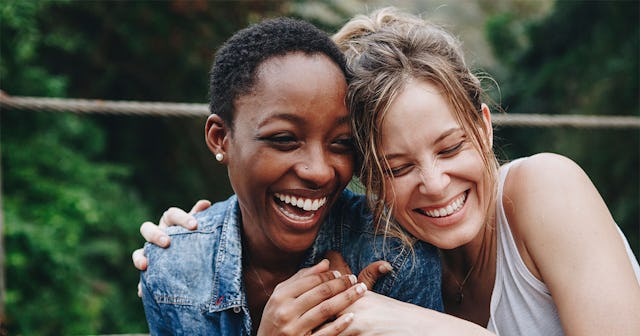You’d Be Interested To Know That Most Romances Don’t Start With Dating

We’re all aware of rom-com tropes where the nerd ends up with the prom-queen-level girl. In “Superbad,” a bumbling, just-outta-high-school kid gets to mall-romance the minxy Emma Stone at the finale. In “There’s Something About Mary,” after many shenanigans, Cameron Diaz chooses the scrotum-zipping dork over all other (even more unlikely) suitors. Add “Revenge of the Nerds” and “The 40-Year-Old Virgin,” and the list keeps going on and on.
And let’s not forget the classics where the insecure, invisible girl wins the affection of the stud guy. Patrick Swayze (plus some smooth footwork) teaches us that “Nobody puts Baby in the corner” and that nothing beats a buttressed swan dive; and, by the end of “16 Candles,” no one can even believe that Molly Ringwald gets to smooch her dreamy crush, Jake — and on her sweet sixteen! Sigh.
Less ubiquitous, it seems to me, are the iconic movies where the boy and girl start a lovely two-sided friendship that eventually blossoms into a doubly-lovely romance. There must be some — but maybe those movies score below a dismal 42% on the Rotten Tomatometer. (I will begrudgingly concede that “When Harry Met Sally” is an exception, but I really don’t remember much besides the food court faux-orgasm.)
This is what I imagine a romance-organically-sprouted-from-a-platonic-friendship movie to look like: 1.) Tom and Bella meet in dental school; 2.) They study together and, when they text/Facetime, the unsexy subject is generally bicuspids and dry sockets; 3.) Who the hell cares what else happens. It takes 12 hours and 38 minutes for their friendship to travel a tediously linear spectrum toward a blooming and very boring romance. Far before that, the audience has developed a collective and thankful narcolepsy.
Maybe the friendship-turned-romance theme just doesn’t work so well on the big screen. It seems, however, that it works pretty damn well in real life.
Danu Stinson, associate professor of psychology at the University of Victoria, has been exploring “relationship initiation” for 20 years. In her newest study, she has narrowed her scope to “friends-first relationship initiation,” which is a topic that, in Stinson’s estimation, has not been explored fully.
Stinson’s findings were predictable in a sense, but also enlightening. “She expected friends-first initiation to be common,” writes CNN’s Sarah Molano, “but she was surprised at how dominant it was in the research.” According to Stinson, two-thirds of romances started platonically, often from friendships that developed over months and even years. Plus, the prevalence of friends-first relationships seems to transcend age, ethnicity, and sexual orientation.
Though there is considerable amount published regarding the immediate spark of attraction, Stinson says there is a dearth of research that considers the friends-first phenom. One impediment lies in the cultural “heterosexist scripts” that can limit scientific inquiry. Stinson explains that today’s assumption is that “relationships start because sexual attraction prompts men to use bold and direct behaviors to make their interest known to women, while women focus on making themselves attractive and waiting for men to ‘make a move.’”
Simply put, since this is the trajectory male-female relationships are expected to take, researchers have not deviated from the script and explored other pathways. Stinson’s study is groundbreaking because it isn’t based on these entrenched beliefs about how romance must be initiated.
Uh oh.
I’m going to out myself right now as a bonafide “entrenchee.” I tend to think of myself as progressive (for a Midwesterner), but I’ve clearly been hypnotized by the sexist constructs to which Stinson refers. After all, I love a good movie cliché, and I probably cheered a little bit when Baby was triumphantly and elegantly hoisted into the air. For decades, I’ve been picking Baby over those two medical students trudging towards romance in my imagined screenplay.
I think I was so enchanted by the idea of immediate sparks (one-sided or not) that I’ve been overlooking what the friendship-first script can look like. I, like so many others, have been conditioned to aggrandize the love-at-first-sight-fireworks-kiss. But what about the sweetness and sizzle of a smacker at 300th sight?
Stinson’s study may inadvertently challenge us to rethink our relationship expectations and biases. At the very least, she has opened the door to a new subject of inquiry. According to Joanne Davila, a professor of clinical psychology and director of the Relationship Development Center at Stony Brook University’s department of psychology, studies needs to continue to see if friends-first or dating-first initiation creates healthier and more stable long-term relationships. Are there appreciable differences?
What if future findings reveal that dating-first couples tended to develop secure, durable, and impenetrable connections? And what if friends-first couples, conversely, were likely to have protracted, volatile love affairs filled with dramatic breakups and passionate reunions? Hmmmmm, sounds compelling. Surely somebody could craft something Cannes-worthy out of that.
This article was originally published on